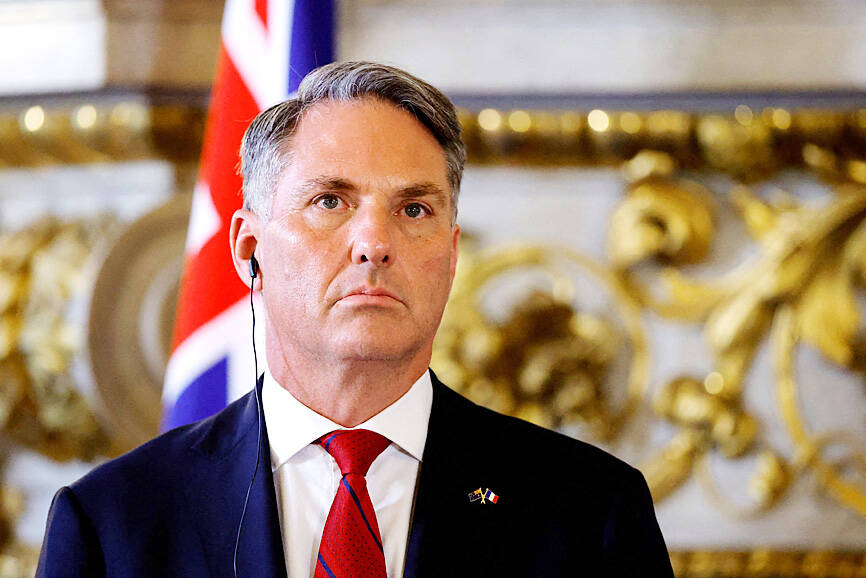Australia has “absolutely not” given the US any commitment as part of the AUKUS negotiations that it would join its top security ally in a potential war over the status of Taiwan, Australian Deputy Prime Minister Richard Marles said yesterday.
Marles, who is also Australian minister for defence, made the comment while defending Australia’s multi-decade plan to acquire nuclear-powered submarines, with help from the US and the UK, at a total cost of up to US$368 billion between now and the mid-2050s.
Marles told the Australian Broadcasting Corp’s (ABC) Insiders program that China’s rapid military buildup “shapes the strategic landscape in which we live.”

Photo: Reuters
The AUKUS submarines would back up Australia’s interest in protecting trade and freedom of navigation and flight in the South China Sea, he said.
Marles said he would not speculate about a future conflict over Taiwan, saying that it was “a completely separate question.”
The US is planning to sell Australia at least three, and as many as five, Virginia-class submarines in the 2030s. Canberra is attempting to fill the “capability gap” between the retirement of its diesel-electric Collins-class submarines and the entry into service of British-designed, Australian-built nuclear-powered submarines from the 2040s.
ABC’s David Speers asked Marles whether Australia had explicitly or implicitly given the US a commitment that it would join the ally in the event of a conflict over Taiwan, in return for access to the Virginia-class submarines.
“The answer to that is of course not,” Marles said. “Of course not — and nor was one sought. I’ve listened to that conjecture from a number of commentators. It is plain wrong.”
Marles said that “the moment that there is a flag on the first of those Virginia-class submarines in the early 2030s is the moment that that submarine will be under the complete control of the Australian government of the day.”
He said the nuclear-powered submarines would have “the capacity to operate in the context of war,” but the primary intent was to “make our contribution to the stability of the region, to the collective security of the region.”
Marles was reluctant to name China as a threat to Australia’s shipping lanes, but said that Beijing is “seeking to shape the world around it in a way that we’ve not seen it do prior to the last decade.”
He said that while a lot of Australia’s trade is with China, “all of our trade to Japan, all of our trade to South Korea — two of our top five trading partners — goes through the South China Sea.”

DEFENDING DEMOCRACY: Taiwan shares the same values as those that fought in WWII, and nations must unite to halt the expansion of a new authoritarian bloc, Lai said The government yesterday held a commemoration ceremony for Victory in Europe (V-E) Day, joining the rest of the world for the first time to mark the anniversary of the end of World War II in Europe. Taiwan honoring V-E Day signifies “our growing connections with the international community,” President William Lai (賴清德) said at a reception in Taipei on the 80th anniversary of V-E Day. One of the major lessons of World War II is that “authoritarianism and aggression lead only to slaughter, tragedy and greater inequality,” Lai said. Even more importantly, the war also taught people that “those who cherish peace cannot

STEADFAST FRIEND: The bills encourage increased Taiwan-US engagement and address China’s distortion of UN Resolution 2758 to isolate Taiwan internationally The Presidential Office yesterday thanked the US House of Representatives for unanimously passing two Taiwan-related bills highlighting its solid support for Taiwan’s democracy and global participation, and for deepening bilateral relations. One of the bills, the Taiwan Assurance Implementation Act, requires the US Department of State to periodically review its guidelines for engagement with Taiwan, and report to the US Congress on the guidelines and plans to lift self-imposed limitations on US-Taiwan engagement. The other bill is the Taiwan International Solidarity Act, which clarifies that UN Resolution 2758 does not address the issue of the representation of Taiwan or its people in

Taiwanese Olympic badminton men’s doubles gold medalist Wang Chi-lin (王齊麟) and his new partner, Chiu Hsiang-chieh (邱相榤), clinched the men’s doubles title at the Yonex Taipei Open yesterday, becoming the second Taiwanese team to win a title in the tournament. Ranked 19th in the world, the Taiwanese duo defeated Kang Min-hyuk and Ki Dong-ju of South Korea 21-18, 21-15 in a pulsating 43-minute final to clinch their first doubles title after teaming up last year. Wang, the men’s doubles gold medalist at the 2020 and 2024 Olympics, partnered with Chiu in August last year after the retirement of his teammate Lee Yang

The Philippines yesterday criticized a “high-risk” maneuver by a Chinese vessel near the disputed Scarborough Shoal (Huangyan Island, 黃岩島) in a rare incident involving warships from the two navies. The Scarborough Shoal — a triangular chain of reefs and rocks in the contested South China Sea — has been a flash point between the countries since China seized it from the Philippines in 2012. Taiwan also claims the shoal. Monday’s encounter took place approximately 11.8 nautical miles (22km) southeast” of the Scarborough Shoal, the Philippine military said, during ongoing US-Philippine military exercises that Beijing has criticized as destabilizing. “The Chinese frigate BN 554 was